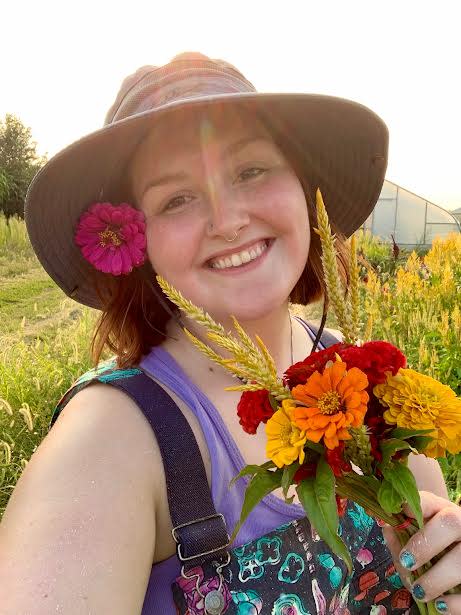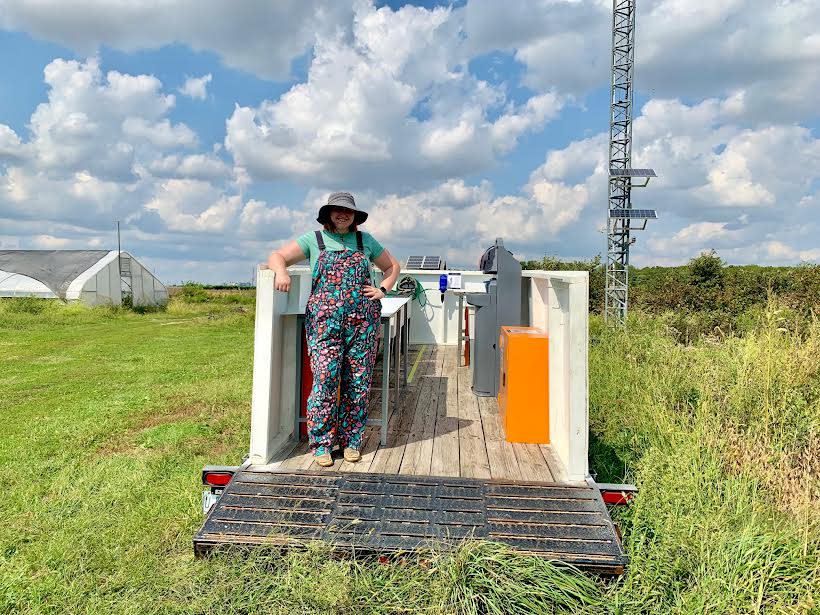A-Town graduate interns with University of Illinois Extension--Here are the details!

URBANA—Over the 2021 summer, Cheyanne Dierickx, a 2017 Abingdon-Avon High School graduate, interned with the University of Illinois Extension's Local Food Systems and and Small Farms unit in Champaign.
More: Dog Obedience School offered. Here’s the details!
"Throughout my time in college, I have held various internships and jobs pertaining to sustainability in agriculture, one being at the Sustainable Student Farm that Erin Harper helped with. I built a strong professional relationship with Erin through that internship, as well as through her horticulture classes and working closely with her when she was the advisor of Small Farm Club, of which I was the president. Erin ended up becoming an Extension Educator for the University of Illinois Extension’s Local Food Systems and Small Farms Unit 13. So, that professional relationship carried over when I applied to be her summer intern with the Extension," said Dierickx.
More: 4-H members participate in public speaking. Here’s who!
Dierickx is currently in graduate school at the University of Illinois at Urbana-Champaign studying Technical Systems Management in the Department of Agricultural and Biological Engineering.
The student was happy with her experience interning with Illinois Extension.
"I thoroughly enjoyed working with the Illinois Extension, particularly the Local Food Systems and Small Farms unit, because I am passionate about ensuring that everyone has safe, affordable, nutritious food that is grown and processed by people that are mentally and physically healthy and are good stewards of the land, and then providing the appropriate resources to educate the public and farmers alike about those topics," she said.
More: 4-H Shooting Sports to hold Spring session
Dierickx had to create a project during the internship.
"Erin came up with the idea for this project before I had even been offered the internship position," explained Dierickx.
After the department was gifted a flatbed trailer, Harper came up with an idea to create a portable washing and packing station for produce for educational and functional purposes.
"She knew that I had many technical and creative skills, along with a strong knowledge of fruit and vegetable production, making me the perfect student to tackle this project," said Dierickx.
The 27'x8' flatbed trailer allowed Dierickx to utilize her technical skills as well as her ability to make nice, educational signage, and also combine that with her knowledge of fruits, vegetables and farming.
What are her technical skills and what knowledge does the young woman obtain of fruits, vegetables, and farming?
More: Fulton County teen among those earning special state 4-H awards
"My undergraduate degree consisted of classes that utilized a lot of math, physics, chemistry, programming, data analysis, hands-on projects, and technical writing, and required a systems-thinking approach to solve problems. Along with those skills, I have strengthened my ability to explain complex concepts to various audiences in a way that they will be most receptive of the information. All of those aspects, coupled with the fact that I have a lot of knowledge about fruit and vegetable production due to my coursework, extracurriculars, and jobs/internships over the years, allowed me to design and build the portable washing and packing station equipped with educational signage and resources in order for people to understand the process that produce goes through from field to your plate safely and efficiently," she explained.
After the idea for the project was born, it was imperative to identify a need for the project. Dierickx thought the project could be used in community and school gardens and it could be brought to county and the state fair, and to educate the general public about food safety protocol after harvesting. She also wanted farmers to be able to actually use this. From that point on, Dierickx conducted a survey.
More: Private applicator/operator in-person, test-only sessions
"The first step in creating the survey was to identify what information we wanted to collect, a.k.a what was the purpose of this survey? Erin and I discussed and concluded that we wanted to get a general idea of what types of food safety measures farms in the area were incorporating into their systems, barriers to implementing certain tools and methods concerning food safety, and whether a portable washing and packing station would be beneficial to either them or other farmers that they know. Then, I created a survey that consisted of questions addressing those topics, along with demographic information, so that we could analyze the needs of local fruit and vegetable farmers. The survey was sent via email to members of the Central Illinois Young Farmers Coalition. We knew the project was going to be useful because 100 percent of respondents said that the portable washing and packing station would be useful to either them or other farmers they know."
More: Fulton County 4-H Week observed; Avondale 4-H Club has winning display
Design process:
The next step of the project was the design process.
"The design process started off with a lot of research. I need to know what types of facilities were out there like this, if any. I also needed to learn a lot about construction, food safety rules and regulations, ideal wash station design, and post-harvest needs of various fruits and vegetables. I conducted a few onsite farm interviews with Matt Turino (Farm Manager at the Sustainable Student Farm), John Williams (Farm Manager at Solia Gratia), and Kaitie Adams (Farm Manager at the Savanna Institute) to obtain their input on the project and any recommendations they had for the design," explained Dierickx.
Condensing the information into three elements (affordability, accessibility, and achievability):
After the design process, Dierickx needed to condense the information into three elements.
More: 4-H shooting sports contest brings fun, camaraderie, teamwork to the range
"The research provided me with an overwhelming amount of information, which could be hard for farmers to digest in order to start a project like this on their own. Therefore, I condensed it down into three main design elements: affordability (can a farm re-create this project within a reasonable budget?), accessibility (can all the essential wash pack aspects be incorporated in an efficient, effective, and inclusive way with the space available, and can materials be bought at places that most farmers have access to?), and achievability (can the average farmer easily replicate this project with knowledge and skills that they already have?)," she said.
Construction process:
Next, came the construction process. This included building aspects such as measurements and math, selecting quality materials, purchasing products, and learning new tools/building strategies.
Did Dierickx receive helping during the process?
"I did receive help during this process from Erin Harper (Local Food Systems and Small Farms Extension Educator), Jennifer Banda (Local Food Systems and Small Farms Program Coordinator), and Matt Turino (Farm Manager at Sustainable Student Farm) when needed, which was greatly appreciated. However, I did the majority of it by myself," she explained.
There were a few things Dierickx needed to keep in mind during the building process.
More: 4-H members learn all the right moves at youth leadership conference
"One big thing that needed to be kept in mind was the amount of wood that was used, not only because of the price at the moment, but also wood is porous and can harbor bacteria, so that is not good for food safety. So, I had to make sure that if wood was used (besides the ground because clean food doesn’t come into contact with the ground), that it was covered with a sealant or another type of material. Another aspect that needed to be kept in mind was the durability of the materials used. We wanted to make sure that the structure would last a long time and not start to fall apart after a few uses," she said.
Those that helped her during this project were much appreciated by Dierickx.
"Erin, Jennifer, and Matt were all great help during this project. They gave useful insight, suggestions, feedback, and help when I needed it all the way from when I was researching background information to completing the construction process. They also helped pick my spirits up when I felt discouraged by some of the big tasks at hand," she said.
More: Fulton County 4-Hers exhibit projects at Illinois State Fair
Other than taking on this large project, Dierickx is majoring in Technical Systems Management with a focus on Agricultural Safety and Health at the University of Illinois at Urbana-Champaign and her Master's Degree work is revolving around farm stress and mental health in farmers and ranchers.
An advocate for mental health:
"I have always been an advocate for mental health, but never thought that I could incorporate it into my academic interests of sustainable agricultural systems. That changed when I took an occupational safety and health class taught by Dr. Josie Rudolphi and started to work as an undergraduate research assistant in her farm stress lab group. Sustainability isn’t just about environmental sustainability, it is also about economic and social sustainability as well. Agriculture is the most dangerous occupation by injury incident rate, and that has social and economic implications, meaning that our food system cannot be sustainable and hold up long-term unless we address the safety and health of our farmers, both mentally and physically."
More: Spanglers inducted Into 4-H Hall of Fame
She further added that there is a strong relationship between poor mental health (anxiety, depression, stress, etc.) and injury rates in agriculture.
"Stress is huge risk factor when it comes to injuries, and also injuries contribute to stress levels, so it is a cycle that could potentially be hard to break for some farmers. There are also special populations within the industry that are more at risk for certain injuries and illness. Special populations in agriculture include women, children, and migrant workers, and each of those populations have an increased risk of mental and physical health ailments due to their own unique experiences in the agricultural industry," she said.
Dierickx also included statistics concerning farm stress and mental health:
•Young farmers and ranchers report significant rates of mental health issues: 60 percent report symptoms of depression and 70 percent report symptoms of anxiety.
•Anxiety and depression are two to three times more common in farm women compared to the general population.
•Migrant farm workers who have been injured on the job are seven times more likely to be depressed.
Dierickx resides in Urbana with her boyfriend, dog, and plenty of houseplants. Her hobbies include gardening/plants (indoors and outdoors), going on hikes with her dog, and lifting weights.

This article originally appeared on Canton Daily Ledger: A-Town grad, Cheyanne Dierickx, interened with U of I Extension

